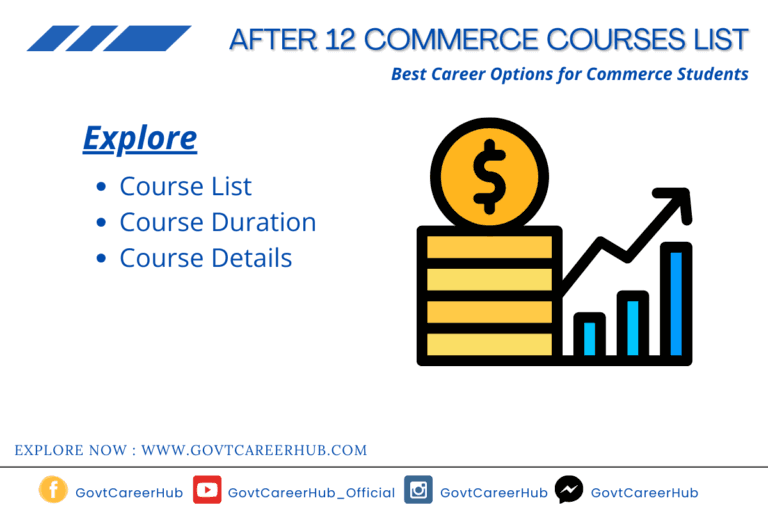Which Course is Easy to Get Job: Top 10 Career-Ready Courses for Indian Students in 2025

Last Updated: August 20, 2025 at 2:20 pm
Introduction
In today’s competitive Indian job market, choosing the right course can make the difference between struggling to find employment and landing a well-paying job within months of graduation. With over 12 million Indians entering the workforce annually and unemployment rates fluctuating between 6-8%, students and parents across India are increasingly asking: which course is easy to get job opportunities?
The concern is genuine. Indian families invest significant resources in education, often taking loans or depleting savings to ensure their children receive quality training. Parents worry about their child’s future stability, while students face pressure to choose courses that guarantee quick employment and good salary prospects.
The reality is that certain courses have consistently higher placement rates and shorter time-to-employment compared to traditional degree programs. These job-oriented courses focus on practical skills that Indian industries desperately need, from IT and digital marketing to healthcare and financial services.
This comprehensive guide will walk you through the most employment-friendly courses available in India today, complete with salary expectations in INR, placement statistics from leading Indian institutes, and insights into which skills are most valued by Indian employers in 2025. Whether you’re a student exploring career options or a parent seeking guidance for your child’s future, this article provides the roadmap to courses that deliver results in the Indian job market.
Understanding Indian Job Market Demands in 2025
The Indian employment landscape has transformed dramatically, especially post-COVID. Understanding current market demands is crucial before selecting any course for quick job opportunities.
Digital Transformation Drive
India’s digital economy is projected to reach $1 trillion by 2025, creating unprecedented demand for tech-savvy professionals. Government initiatives like Digital India have accelerated adoption of digital services across sectors, from rural banking to e-governance. This shift has created millions of jobs requiring digital literacy and technical skills.
The IT services industry alone employs over 4.5 million people, with tier-2 and tier-3 cities emerging as new employment hubs. Companies like TCS, Infosys, and Wipro are actively hiring from smaller cities, making technology courses accessible career options regardless of location.
Skill India and Industry Collaboration
The Skill India mission has transformed vocational training, with over 1.4 crore people trained across various sectors. Industry partnerships with training providers ensure course curricula align with actual job requirements. This government backing has increased employer confidence in skill-based certifications.
Manufacturing sectors under Make in India have created demand for specialized technical skills, quality control expertise, and project management capabilities. The automotive, textile, and electronics industries are particularly active in hiring skilled professionals.
Service Sector Growth
India’s service sector continues to dominate employment, contributing 54% to GDP. Healthcare, financial services, retail, and logistics are experiencing robust growth. The rise of fintech, edtech, and healthtech startups has created numerous entry-level opportunities for candidates with relevant certifications.
The gig economy has also expanded significantly, with platforms like Swiggy, Zomato, Urban Company, and freelancing sites creating flexible employment options. This trend favors courses that develop transferable skills applicable across multiple industries.
Regional Industry Clusters
Different Indian states have developed industry specializations creating localized job markets. Bangalore and Hyderabad for IT, Pune for automotive and IT, Chennai for healthcare and automotive, Mumbai for finance and entertainment, and Delhi NCR for diverse industries. Understanding regional strengths helps students choose courses aligned with local opportunities.
Top 10 Courses That Guarantee Quick Employment in India
1. Digital Marketing
Course Duration: 3-6 months
Average Course Fee: ₹15,000 – ₹50,000
Starting Salary: ₹2.5 – ₹4 lakhs per annum
Placement Rate: 85-90%
Digital marketing has become essential for Indian businesses of all sizes. From local shops setting up online presence to major corporations expanding digital reach, demand for digital marketing professionals is soaring.
Key Skills Covered:
- Search Engine Optimization (SEO)
- Google Ads and Facebook advertising
- Social media marketing
- Email marketing and automation
- Content marketing and blogging
- Analytics and performance tracking
Career Opportunities: Digital marketing executive, SEO specialist, social media manager, content strategist, performance marketing analyst.
Top Recruiting Companies: Flipkart, Amazon, Paytm, Byju’s, Unacademy, local digital agencies, e-commerce startups.
2. Data Analytics and Business Intelligence
Course Duration: 4-8 months
Average Course Fee: ₹25,000 – ₹80,000
Starting Salary: ₹3.5 – ₹6 lakhs per annum
Placement Rate: 80-85%
Data is the new oil, and Indian companies are investing heavily in data-driven decision making. From banking and retail to healthcare and manufacturing, every sector needs professionals who can analyze data and provide actionable insights.
Key Skills Covered:
- Excel advanced functions and pivot tables
- SQL database querying
- Python/R programming basics
- Data visualization (Tableau, Power BI)
- Statistical analysis and reporting
- Business intelligence tools
Career Opportunities: Data analyst, business analyst, reporting specialist, data visualization expert, junior data scientist.
Top Recruiting Companies: TCS, Accenture, Deloitte, KPMG, Mu Sigma, banks, retail chains, consulting firms.
3. Cybersecurity
Course Duration: 4-6 months
Average Course Fee: ₹30,000 – ₹70,000
Starting Salary: ₹4 – ₹7 lakhs per annum
Placement Rate: 75-80%
With increasing cyber threats and data breaches, cybersecurity has become a critical concern for Indian businesses. The government’s push for digital governance has further increased demand for security professionals.
Key Skills Covered:
- Network security fundamentals
- Ethical hacking and penetration testing
- Security audit and compliance
- Incident response and forensics
- Risk assessment and management
- Security tools and technologies
Career Opportunities: Cybersecurity analyst, security consultant, ethical hacker, compliance officer, security architect.
Top Recruiting Companies: IBM, Microsoft, Wipro, HCL, government agencies, banking sector, healthcare organizations.
4. Cloud Computing
Course Duration: 3-6 months
Average Course Fee: ₹20,000 – ₹60,000
Starting Salary: ₹4 – ₹8 lakhs per annum
Placement Rate: 82-88%
Cloud adoption in India is accelerating rapidly, with businesses migrating to platforms like AWS, Microsoft Azure, and Google Cloud. This creates massive demand for professionals who can manage cloud infrastructure.
Key Skills Covered:
- AWS/Azure/Google Cloud Platform basics
- Cloud architecture and deployment
- DevOps tools and practices
- Container technologies (Docker, Kubernetes)
- Cloud security and monitoring
- Cost optimization strategies
Career Opportunities: Cloud engineer, DevOps engineer, cloud architect, system administrator, cloud consultant.
Top Recruiting Companies: Amazon, Microsoft, Google, TCS, Infosys, Cognizant, startups, enterprises across sectors.
5. Web Development and App Development
Course Duration: 4-8 months
Average Course Fee: ₹25,000 – ₹75,000
Starting Salary: ₹3 – ₹6 lakhs per annum
Placement Rate: 85-90%
India’s startup ecosystem and digital transformation initiatives have created enormous demand for web and mobile app developers. Even small businesses now need websites and apps, ensuring steady job availability.
Key Skills Covered:
- HTML, CSS, JavaScript fundamentals
- Frontend frameworks (React, Angular, Vue.js)
- Backend development (Node.js, Python, PHP)
- Database management (MySQL, MongoDB)
- Mobile app development (React Native, Flutter)
- Version control and deployment
Career Opportunities: Frontend developer, backend developer, full-stack developer, mobile app developer, UI/UX developer.
Top Recruiting Companies: Flipkart, Paytm, Swiggy, Zomato, tech startups, IT services companies, product companies.
6. Healthcare Courses
Course Duration: 6 months – 2 years (depending on specialization)
Average Course Fee: ₹20,000 – ₹1,50,000
Starting Salary: ₹2.5 – ₹5 lakhs per annum
Placement Rate: 90-95%
Healthcare is one of India’s fastest-growing sectors, accelerated by increased health awareness post-COVID. Various healthcare courses offer excellent job security and growth prospects.
Popular Options:
- Medical Coding and Billing (6 months)
- Nursing and Healthcare Management (1-2 years)
- Pharmacy Technology (1 year)
- Medical Laboratory Technology (1-2 years)
- Physiotherapy Assistant (6-12 months)
Career Opportunities: Medical coder, healthcare administrator, pharmacy technician, lab technician, patient care coordinator.
Top Recruiting Companies: Apollo Hospitals, Fortis, Max Healthcare, Manipal Hospitals, healthcare BPOs, insurance companies.
7. Banking and Finance
Course Duration: 3-8 months
Average Course Fee: ₹15,000 – ₹50,000
Starting Salary: ₹2.8 – ₹5 lakhs per annum
Placement Rate: 80-85%
India’s financial services sector continues expanding with fintech growth and financial inclusion initiatives. Banking courses provide stable career paths with good growth potential.
Key Areas:
- Banking operations and customer service
- Financial planning and analysis
- Insurance and risk management
- Investment advisory and wealth management
- Fintech and digital payments
- Credit analysis and loan processing
Career Opportunities: Banking associate, financial advisor, credit analyst, insurance advisor, fintech specialist.
Top Recruiting Companies: HDFC Bank, ICICI Bank, SBI, Axis Bank, Kotak Mahindra, Paytm, PhonePe, fintech startups.
8. Sales and Customer Service
Course Duration: 2-4 months
Average Course Fee: ₹10,000 – ₹30,000
Starting Salary: ₹2.2 – ₹4 lakhs per annum
Placement Rate: 90-95%
Sales and customer service roles are consistently in high demand across all industries. These courses focus on communication skills, product knowledge, and relationship management.
Key Skills Covered:
- Sales techniques and customer psychology
- CRM software and lead management
- Communication and presentation skills
- Negotiation and closing strategies
- Customer service excellence
- Industry-specific product knowledge
Career Opportunities: Sales executive, business development associate, customer success manager, account manager, relationship manager.
Top Recruiting Companies: BYJUS, Unacademy, real estate companies, insurance firms, retail chains, telecom companies.
9. Project Management
Course Duration: 3-6 months
Average Course Fee: ₹25,000 – ₹60,000
Starting Salary: ₹4 – ₹7 lakhs per annum
Placement Rate: 75-82%
Project management skills are valuable across industries, from construction and manufacturing to IT and consulting. Certified project managers are in high demand as Indian businesses focus on efficiency and delivery.
Key Certifications:
- Project Management Professional (PMP)
- Certified ScrumMaster (CSM)
- PRINCE2 Foundation and Practitioner
- Agile and Lean methodologies
- Microsoft Project and project tools
- Risk management and quality assurance
Career Opportunities: Project coordinator, project manager, scrum master, program manager, delivery manager.
Top Recruiting Companies: TCS, Infosys, Wipro, Accenture, L&T, construction companies, consulting firms.
10. Graphic Design and UI/UX
Course Duration: 4-8 months
Average Course Fee: ₹20,000 – ₹70,000
Starting Salary: ₹2.5 – ₹5 lakhs per annum
Placement Rate: 80-85%
Visual communication has become crucial in the digital age. Indian startups, e-commerce companies, and traditional businesses need creative professionals for branding, marketing, and user experience design.
Key Skills Covered:
- Adobe Creative Suite (Photoshop, Illustrator, InDesign)
- UI/UX design principles and tools (Figma, Sketch)
- Web design and responsive layouts
- Brand identity and logo design
- Digital marketing creatives
- User research and prototyping
Career Opportunities: Graphic designer, UI/UX designer, visual designer, brand designer, digital marketing creative.
Top Recruiting Companies: Flipkart, Zomato, Swiggy, advertising agencies, design studios, e-commerce companies, startups.
Factors Indian Students Should Consider When Choosing a Course
Personal Interest and Aptitude Assessment
Before selecting any course based solely on job prospects, honest self-assessment is crucial. A student passionate about technology will excel in programming courses, while someone with strong communication skills might thrive in sales or digital marketing. Indian students often face family pressure to choose “safe” options, but personal interest significantly impacts long-term career satisfaction and growth.
Consider taking aptitude tests available on platforms like MyPlan.com or seeking career counseling to understand your strengths. Many Indian career guidance centers offer comprehensive assessments that factor in personality traits, learning preferences, and skill sets.
Local vs Metro City Job Opportunities
The job market varies significantly across Indian cities. While metro cities like Mumbai, Delhi, Bangalore, and Chennai offer more opportunities, competition is intense and living costs are high. Tier-2 cities like Pune, Hyderabad, Ahmedabad, and Coimbatore are emerging as attractive alternatives with growing industries and lower costs.
Research the primary industries in your target location. For instance, if you’re from Kerala, focus on courses relevant to IT services, tourism, or marine industries. Students from Rajasthan might benefit from courses related to renewable energy, mining, or heritage tourism.
Course Investment and Return on Investment
Calculate the total course cost including fees, materials, travel, and accommodation if required. Compare this against expected starting salaries and career growth potential. A ₹50,000 investment in a course that leads to a ₹4 lakh annual salary provides much better ROI than a ₹2 lakh course leading to similar earnings.
Consider family financial situation realistically. Many quality courses are available at affordable prices through government skill development programs, online platforms, and community colleges. Don’t assume expensive courses guarantee better outcomes.
Time Investment vs Family Expectations
Indian families often have specific timelines for their children’s career establishment. Balance course duration with family expectations and personal goals. Shorter certification courses (3-6 months) can provide quick employment, allowing you to earn while pursuing additional qualifications.
Some students benefit from combining shorter courses with part-time work or internships. This approach provides practical experience while building multiple skill sets.
Language and Communication Requirements
English proficiency remains crucial for many high-paying jobs in India. Honestly assess your communication skills and choose courses that match your current abilities while providing opportunities to improve. Some technical courses require less verbal communication initially, allowing time to develop language skills.
Regional language skills can be advantageous in certain markets. For example, Tamil proficiency helps in Chennai’s job market, while Hindi fluency is valuable in North Indian cities.
Government Jobs vs Private Sector Opportunities in India
Popular Government Job-Oriented Courses
Government employment continues to attract Indian students due to job security, pension benefits, and social status. However, competition is extremely intense with lakhs of candidates applying for thousands of positions.
High-Demand Government Exams:
- Staff Selection Commission (SSC) for central government posts
- Institute of Banking Personnel Selection (IBPS) for public sector banks
- Railway Recruitment Board (RRB) for railway positions
- Union Public Service Commission (UPSC) for civil services
- State Public Service Commissions for state government roles
Preparation Timeline: Government job preparation typically requires 1-2 years of dedicated study. Success rates are low due to high competition, making it risky as the sole career strategy.
Coaching Industry: The government job coaching industry is worth thousands of crores, with centers in every major city. However, success is not guaranteed despite significant investment in coaching fees.
Private Sector High-Demand Skills
Private sector jobs often offer faster career growth, higher salaries, and diverse experiences. The trade-off is less job security compared to government positions, but skilled professionals can build portable careers.
Growth Industries:
- Information Technology and Software Services
- Financial Services and Fintech
- Healthcare and Pharmaceuticals
- E-commerce and Retail
- Renewable Energy and Infrastructure
- Education Technology (EdTech)
Private companies value skills over degrees, making certification courses particularly valuable. Performance-based growth can lead to rapid salary increases and leadership opportunities.
Public Sector Undertaking (PSU) Opportunities
PSUs offer a middle ground between government and private sector employment. Companies like ONGC, NTPC, BHEL, and Indian Oil recruit through GATE scores and specialized exams.
Engineering and management courses aligned with PSU requirements can provide excellent career paths. These positions offer government-like job security with better compensation than traditional government roles.
Startup Ecosystem and Entrepreneurship
India’s startup ecosystem has created unprecedented opportunities for young professionals. Startups value skills, creativity, and adaptability over traditional credentials.
Startup-Friendly Skills:
- Digital marketing and growth hacking
- Product management and user experience
- Business development and sales
- Technology development and innovation
- Content creation and community building
Working in startups provides diverse experience and potential for rapid career advancement. However, job security is lower, and success depends on the company’s performance.
Freelancing and Remote Work Opportunities
The COVID-19 pandemic accelerated acceptance of remote work in India. Many professionals now work for international clients, earning in foreign currencies while living in India.
High-Demand Freelance Skills:
- Web development and mobile app development
- Digital marketing and SEO services
- Content writing and copywriting
- Graphic design and video editing
- Virtual assistance and data entry
- Online tutoring and course creation
Freelancing provides flexibility and potentially higher earnings but requires self-discipline and business management skills.
Conclusion
Choosing the right course for quick employment in India requires balancing personal interests, market demands, family expectations, and financial considerations. The courses outlined in this guide – from digital marketing and data analytics to healthcare and sales – offer proven pathways to stable employment and career growth.
The key to success lies not just in selecting the right course, but in approaching it with dedication, completing practical projects, and continuously updating skills as industries evolve. Indian students who combine technical skills with strong communication abilities and cultural awareness consistently outperform their peers in the job market.
Remember that which course is easy to get job depends on your individual circumstances, location, and commitment level. Start by assessing your interests and local job market, choose a course that aligns with both, and invest fully in the learning process. With the right approach, these job-oriented courses can transform your career prospects and provide the financial stability that Indian families value.
The Indian job market rewards skilled professionals who can adapt to changing business needs. Whether you choose technology, healthcare, finance, or sales, focus on building practical skills that solve real business problems. This approach will ensure long-term career success regardless of economic fluctuations or industry changes.
Frequently Asked Questions
These articles might be helful:
- Best Easy Courses After 12th for Govt Jobs in India: Your 2025 Career Guide
- Best Easy Courses After 12th Commerce with High Salary
- Top 10 Easy Yet High Salary Courses After 12th Commerce – A Smart Student’s Guide
- Which Govt Exam is Easy to Crack? Your Complete Guide to Landing a Government Job
- Which Diploma Course is Best for a Government Job? A Practical Guide
- Best Courses Other Than Engineering After 12th Science in India – Explore Top Career Options






